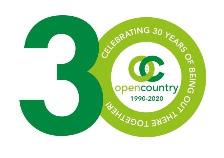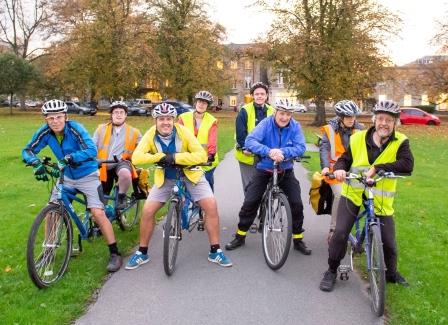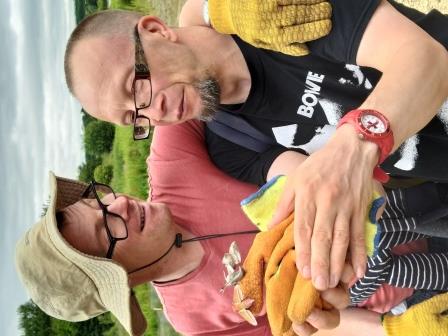Towards an accessible countryside
This post is greater than 6 months old - links may be broken or out of date. Proceed with caution!

By David Shaftoe, Open Country

Open Country, the Yorkshire-based charity for whom I work, gives people with a disability the chance to access and enjoy the countryside by providing a wide variety of outdoor activities, including walking, cycling, nature conservation projects, wildlife study and outings. We also offer a wealth of access publications, advice and training.
We were established exactly 30 years ago to examine why so few apparently disabled people visited the countryside. Three decades on, the national picture is much brighter but there remains a substantial amount of work to be done to deliver a truly inclusive countryside.
Open Country has always had a ‘can-do’ approach to improving ‘access for all’. Some staff members have been countryside managers themselves and we would rather work with oft-beleaguered land managers than against them. There is much to be gained from encouraging inclusive access, as disabled people are a powerful force for good in the countryside. Each year for example, our conservation work parties complete around 2,000 work days in the countryside – an in-kind contribution of volunteer time of over £100,000. At a difficult time economically, when many budgets are being re-evaluated, the countryside industry surely needs all the friends that it can get and encouraging more people to discover the great outdoors can only be beneficial for our Industry.
There can be a dearth of information on the subject of ‘access for all’. One good source is ‘By All Reasonable Means’ (2017) an inclusive access guide re-written by Natural Resources Wales as part of its Equality Act 2010 commitment to ensuring access to the countryside and open spaces is equally available to people of all ages, circumstances and backgrounds. It is designed to help countryside and natural resource managers improve accessibility of their sites, routes and facilities, particularly for people who have limited opportunities to enjoy these places. The aim is to provide a realistic, practical and effective approach to access improvements, creating more access, in more places, for more people. Most importantly for countryside managers, the publication has really useful access standards, which are easy to follow.
Open Country agrees with the principle that access improvements will benefit all visitors. ‘Accessibility’ should be addressed in its widest sense, embracing all the protected characteristics identified by the Equality Act (2010).

With just a small fraction of the countryside fully accessible, doing nothing is not an option. We espouse the principle of ‘Least Restrictive Access’ - an approach that aims for the highest standards reasonably possible for a particular piece of work. To illustrate the principle, a visitor attraction we use holds snowdrop walks for a few weeks each year. Clearly, undertaking major access improvement works is not an economic or realistic option. However they painted prominent tree roots and overhanging branches in brilliant white so that, at the very least, some visually-impaired people could navigate their way round the walk more safely. Disabled people do not expect heaven and earth to be moved for them; neither should they expect to be ignored.
Physical access is just one of the barriers facing disabled people wanting to access the countryside. However it remains the pivotal consideration. It is important to remember that any barrier, however well-intentioned, will be a barrier to someone. As an example, stiles are sources of despair and injury to walkers, both disabled and non-disabled, the country over. A phased replacement of all stiles nationally is surely long overdue? It is notable that sustainable travel charity Sustrans has a goal to remove or redesign all 16,000 barriers on the National Cycle Network to make it accessible to everyone, with no barriers in place, for continuous travel for everyone.

Other barriers to welcoming disabled people into the countryside can include a lack of accessible information, lack of support, lack of accessible transport and lack of financial resources. Thus it is important to think widely - a countryside manager could foreseeably have the most physically accessible site in the country and yet still have few disabled visitors if other access factors have not been considered.
There is no room for complacency. Improving access is a continuum and it is usually possible to enhance the visitor experience at sites that are already deemed ‘accessible’. Expectations of accessible infrastructure change and what were seen as ‘accessible’ barriers twenty years ago may now be met with scorn. Furthermore, evolving technology means that new developments like audio walks, off-road scooters and hand-cranked trikes are opening up hitherto inaccessible countryside to more disabled people.
Disabilities are legion and everyone is an Individual, so it is important to solicit as wide a range of views as possible. For example, an electric scooter user, however well-intentioned, may have little worthwhile to say on the experiences of someone with agoraphobia or an assistance dog. A truly inclusive approach to access by definition involves considering the needs of everyone.
It is important to listen, rather than presuming to know what disabled people want or need. For example, our tandem cycling clubs are now a cornerstone of our work and yet arose from one chance conversation with a member who sustained a brain injury from a cycling accident as a schoolboy and subsequently wished to cycle again. In trying to accommodate his needs as an individual, we unintentionally spawned something that now benefits hundreds of people each year.
‘Build it and they will come’. It’s true – adopt a positive attitude to inclusive access and you’ll rarely be disappointed! Time and time again we find that sites and organisations that invest time, thought and yes, money in improving access will reap the benefits in increased visitor figures by the disability community. To illustrate, both Redcar and Bridlington on the Yorkshire coast seem to have seen their access enhancement on their seafronts amply rewarded by more and more visitors using wheelchairs.
As we celebrate our 30th Anniversary, Open Country knows there is still much work to be done to achieve a truly accessible countryside. Contact us if you would like to work together. For more information about our work, visit visit www.opencountry.org.uk
More from Open Country